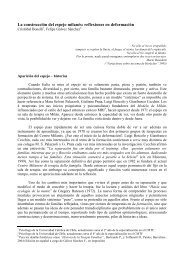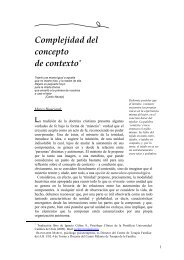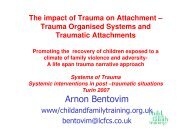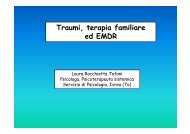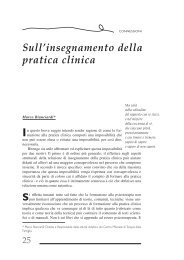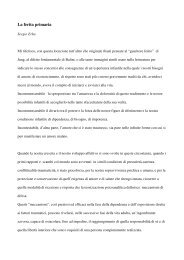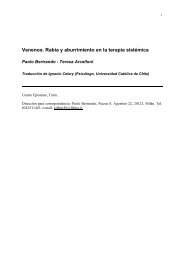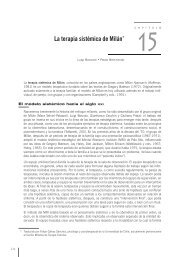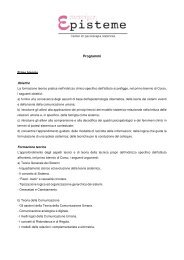Socio-Political Aspects in Constructing Meaning to ... - Episteme
Socio-Political Aspects in Constructing Meaning to ... - Episteme
Socio-Political Aspects in Constructing Meaning to ... - Episteme
You also want an ePaper? Increase the reach of your titles
YUMPU automatically turns print PDFs into web optimized ePapers that Google loves.
<strong>Socio</strong>-<strong>Political</strong> <strong>Aspects</strong> <strong>in</strong> Construct<strong>in</strong>g<br />
Mean<strong>in</strong>g <strong>to</strong> National Trauma<br />
Michal Shamai, Ph.D<br />
School of Social Work<br />
Faculty of Social Welfare and Health Science, University<br />
of Haifa, Israel<br />
The systems of trauma: Systemic <strong>in</strong>tervention <strong>in</strong> posttraumatic<br />
situations, September 28-29, 2007<br />
Aula magna Istitu<strong>to</strong> Avogadro, Tur<strong>in</strong>, Italy
"My parents came <strong>to</strong> Israel from the<br />
horror of the Holocaust …they came<br />
here <strong>in</strong> order <strong>to</strong> have a state where it<br />
would be possible <strong>to</strong> feel safe…they<br />
wanted <strong>to</strong> have a piece of land <strong>in</strong> this<br />
world where they could feel safe.<br />
Unfortunately, the loss of my son is a<br />
Holocaust for me."
Personal <strong>Aspects</strong> (cognition,<br />
emotions, his<strong>to</strong>ry)<br />
Systemic <strong>Aspects</strong> (family,<br />
community, his<strong>to</strong>ry)<br />
Social <strong>Aspects</strong> (society, culture,<br />
ethnicity, his<strong>to</strong>ry)
Narrative of National Trauma<br />
Present<br />
Society, Culture<br />
Family, Community<br />
Personal<br />
His<strong>to</strong>ry
<strong>Political</strong> aspects have a significant<br />
impact on the process and<br />
content of <strong>in</strong>dividuals' and<br />
societies' narratives concern<strong>in</strong>g<br />
with the traumatic events.<br />
<strong>Political</strong> aspects can affect the<br />
level of impairment caused by the<br />
trauma as well as the level of<br />
resilience <strong>in</strong> cop<strong>in</strong>g with it.
A trauma can be perceived as a<br />
‘cultural or collective trauma’<br />
when members with a national,<br />
ethnic, or religious sense of<br />
belong<strong>in</strong>g <strong>to</strong> a collective feel they<br />
have been subjected <strong>to</strong> fearful<br />
and pa<strong>in</strong>ful events which leave<br />
marks upon their collective<br />
consciousness and memory<br />
<strong>in</strong>clud<strong>in</strong>g an impact on the future<br />
identity of the collective.
Collective or cultural trauma is a<br />
socially constructed process.
The narrative regard<strong>in</strong>g the<br />
trauma is developed accord<strong>in</strong>g <strong>to</strong>:<br />
The nature of the pa<strong>in</strong>,<br />
The nature of the victim,<br />
The relationships between the<br />
victims and the society<br />
The nature of those who are<br />
responsible for caus<strong>in</strong>g the pa<strong>in</strong>.
“I I went <strong>to</strong> a regular meet<strong>in</strong>g of<br />
the direc<strong>to</strong>rs of the departments<br />
of social services. I tried <strong>to</strong> tell<br />
them about the difficult situation<br />
we experience. Their response<br />
was horrible; they <strong>to</strong>ld me that<br />
we have chosen <strong>to</strong> live <strong>in</strong> the<br />
occupied areas so we can’t<br />
compla<strong>in</strong> about the stress.”
Terrorism is a deliberate use of<br />
violence or threat of its use<br />
aga<strong>in</strong>st <strong>in</strong>nocent people, with the<br />
aim of <strong>in</strong>timidat<strong>in</strong>g them or other<br />
people <strong>in</strong><strong>to</strong> a course of action that<br />
they otherwise would not take.<br />
Terror is an act <strong>in</strong> which the<br />
perpetra<strong>to</strong>rs are prepared <strong>to</strong><br />
sacrifice all moral and<br />
humanitarian considerations for a<br />
political end.
National terror is an act or threat<br />
of violence aga<strong>in</strong>st<br />
noncombatants with the objective<br />
of exact<strong>in</strong>g revenge, <strong>in</strong>timidat<strong>in</strong>g<br />
or otherwise <strong>in</strong>fluenc<strong>in</strong>g an<br />
audience.
Loss <strong>in</strong> the collective context<br />
1) Attribut<strong>in</strong>g mean<strong>in</strong>g <strong>to</strong> the loss;<br />
describ<strong>in</strong>g the loss <strong>in</strong> the context<br />
of Jewish and Israeli his<strong>to</strong>ry.<br />
2) Assign<strong>in</strong>g responsibility for the<br />
loss.<br />
3) Us<strong>in</strong>g the collective mean<strong>in</strong>g <strong>in</strong><br />
the process of cop<strong>in</strong>g.
“… the name Gordofsky is<br />
f<strong>in</strong>ished… there won’t t be any one<br />
with this name <strong>in</strong> the future.”
“I I am a religious person and<br />
accord<strong>in</strong>g <strong>to</strong> the tradition Netta<br />
died for Kiddush Hashem<br />
(sanctification of God's name).<br />
However, for me it is not<br />
someth<strong>in</strong>g that I th<strong>in</strong>k<br />
au<strong>to</strong>matically, I have <strong>to</strong> do some<br />
th<strong>in</strong>k<strong>in</strong>g and conv<strong>in</strong>ce myself that<br />
it was Kiddush Hashem.”
“…immediately after Itai was killed, I<br />
made the decision <strong>to</strong> cont<strong>in</strong>ue<br />
normal life and <strong>to</strong> keep the family<br />
function<strong>in</strong>g. This was very important<br />
for me and the family. My parents<br />
survived the Holocaust, but my<br />
mother became mentally ill after all<br />
she had gone through. It was a sad<br />
house. I did not want my children <strong>to</strong><br />
have such an experience. I know that<br />
if the family doesn’t t function, if we<br />
break down, it will be a vic<strong>to</strong>ry for<br />
the terrorists, so I don’t t want <strong>to</strong> give<br />
them an additional vic<strong>to</strong>ry.”
Conclusions – Social level:<br />
The f<strong>in</strong>d<strong>in</strong>gs highlight the significance<br />
of memorial rituals <strong>in</strong> which the<br />
victims and their family members are<br />
acknowledged by the society at large.<br />
It is also important that the formal<br />
<strong>in</strong>stitutions of a state compensate<br />
victims and their families for the loss.
Conclusions - cl<strong>in</strong>ical level:<br />
It is crucial <strong>to</strong> explore various aspects<br />
of the mean<strong>in</strong>g attached <strong>to</strong> the<br />
narrative of the trauma, <strong>in</strong>clud<strong>in</strong>g<br />
socio-political elements<br />
It is the role of the therapist <strong>to</strong> po<strong>in</strong>t<br />
<strong>to</strong> relevant aspects that might help<br />
victims (<strong>in</strong>dividuals, families,<br />
communities, and societies) <strong>to</strong> build a<br />
comprehensive narrative of the trauma,<br />
while emphasiz<strong>in</strong>g the victims’ sense<br />
of belong<strong>in</strong>g <strong>to</strong> a group.
peace



